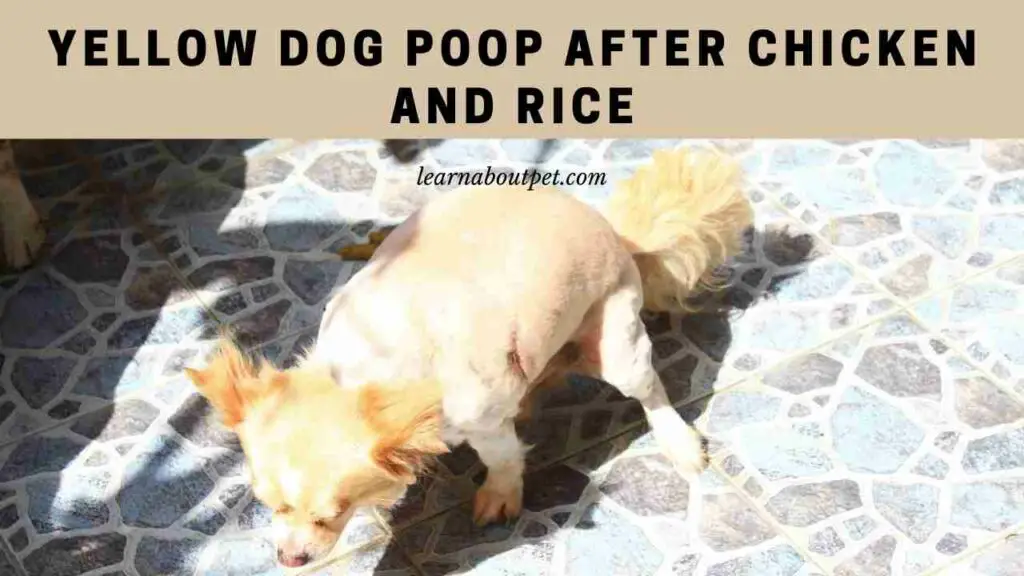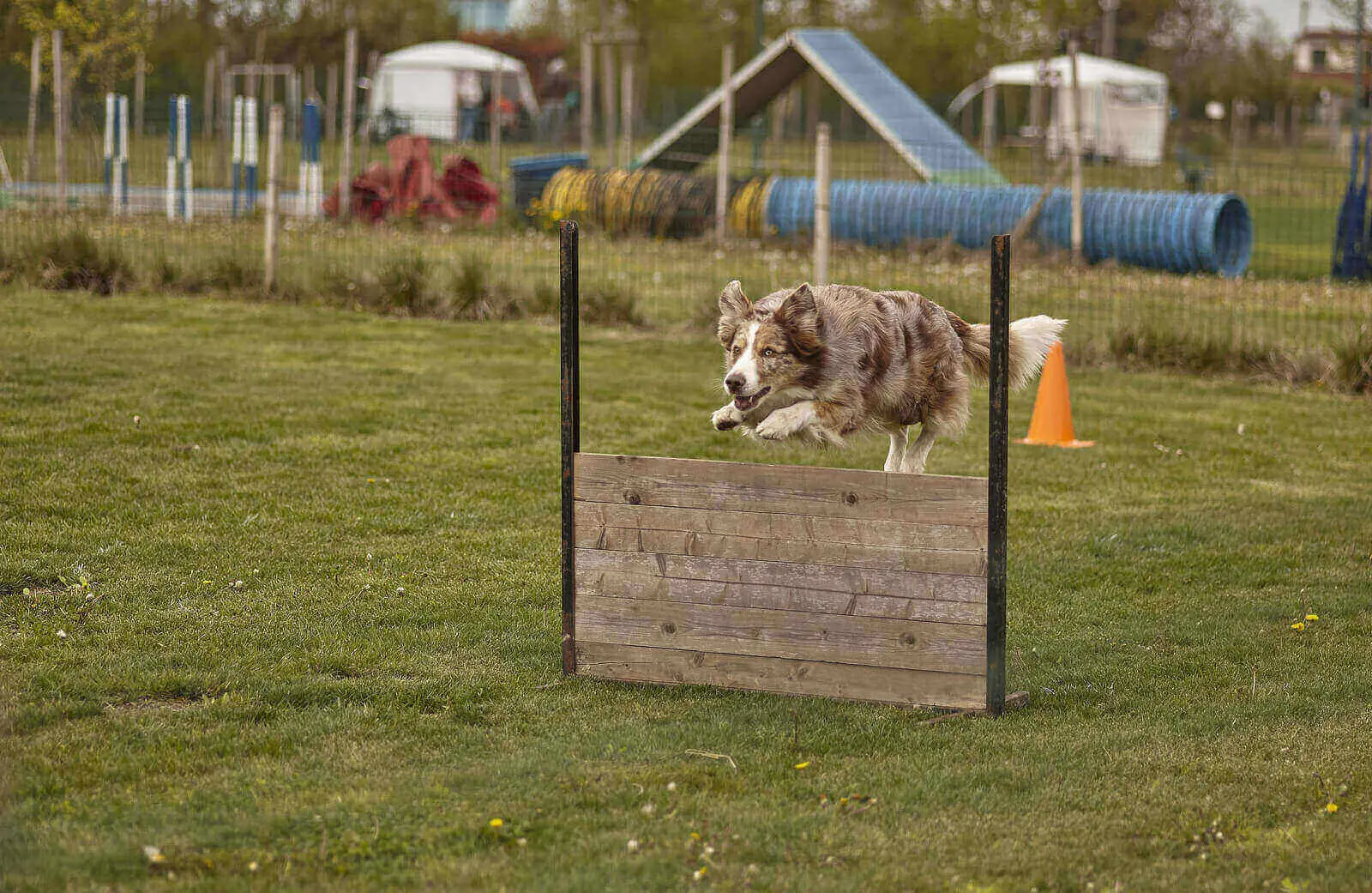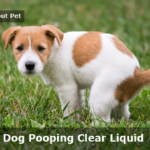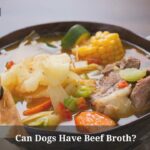After starting to feed your dog on chicken and rice, you may notice that his poop is now yellow. This may get you worried, as you try to find out whether it is normal, what it means and what you can do about it. Read on, for answers.
Yellow dog poop after chicken and rice is quite normal. In most cases, the change in color of dog poop is due to the minor stomach upset, which follows the change in diet. But it can also be an indication that the dog has intolerance for either chicken or rice.

Why Feed A Dog Chicken And Rice?
Before venturing to understand what causes yellow dog poop after chicken and rice, we first need to pause, and understand why one would feed a dog on chicken and rice.
As it turns out, most of the people who feed their dogs on chicken and rice do so on the strength of vets’ advice. This advice is typically given to people whose dogs have diarrhea problems.
There are two things about rice which make it helpful to dogs with diarrhea. First is the fact that rice has a binding property. This can help in firming up dog stool, thus solving the diarrhea problems.
Second is the fact that rice has white soluble fiber. This fiber can absorb water passing through the dog’s GI tract. This is water that would otherwise have caused the dog diarrhea. But once the rice absorbs it, it is no longer in the system.
Thus, the dog ends up passing hard stool, as opposed to loose stool that is characteristic of diarrhea.
Of course, there are people who feed their dogs chicken and rice as treats. There are also those who feed dogs chicken and rice because that is all they have to feed the canines.
Now what sometimes follows is a situation where dog has yellow poop after chicken and rice. The poop is often in mustard yellow color. This leads to the question, what does mustard yellow dog poop mean?
Sometimes, while recovering from the diarrhea, the dog’s poop may initially look like mucus, but with yellow color. This leads to the complaints about yellow mucus dog poop after chicken and rice.
Does Chicken Make Dog Poop Yellow?
Upon discovering yellow dog poop after chicken and rice, people tend to raise several questions. One of those is this one, on whether chicken makes dog poop yellow.
The truth of the matter is that any new food that a dog doesn’t usually eat can cause yellow poop. This is because the introduction of new foods tends to cause stomach upsets in dogs. The stomach upsets in turn lead to yellow poop.
Therefore if chicken is not something that your dog normally eats, and then you feed him on it, he may end up with yellow poop.
This is consistent with the normal phenomenon, where we see yellow dog poop after changing food.
Thus, when you see yellow dog poop after chicken and rice, you need to understand it within this context.
The yellow dog poop after a meal of chicken is quite normal – especially if chicken is not something that the dog normally eats. The dog would likely have similarly yellow poop even if it were another new dish you were introducing.
Does Rice Make Dogs Poop Yellow?
On another note, once you discover yellow dog poop after chicken and rice, you may want to know, can rice cause yellow stool in dogs?
The answer is ‘yes’. Rice can cause yellow poop in dogs: especially if it is not something that the dogs normally have. This, in other words, is if the rice is a new food to the dogs.
Thus, if you see bright yellow poop after chicken and rice in a dog, it is likely to be due to an upset stomach. And the upset stomach is likely to be due to the fact that these are ‘new’ foods. In other words, foods that the dog is not used to.
Once the dog gets used to the rice, you may see its poop color go back to normal. Alternatively, once you get the dog off the rice and chicken diet, its poop color may go back to normal.
Does Chicken And Rice Make Dog Poop Yellow?
Chicken and rice can make dog poop yellow.
If the dog doesn’t usually eat chicken and rice, this means that those are ‘new’ foods for it. When a dog starts a new food, it tends to have an upset stomach. The consequence of that is often yellow stool.
There are, however, cases where you find that chicken and rice are not new foods to a dog. Yet the dog keeps on passing yellow poop after eating them. That is in spite of them not being new foods to it.
This leads to an interesting question: why does chicken and rice make your dog’s poop yellow, even when it is not a new food to the dog? In other words, can chicken and rice cause yellow poop in dogs, even when the dogs have had it before?
As it turns out, there are dogs whose systems have intolerance for either chicken or rice. Such dogs will always end up passing yellow poop whenever they have either chicken or rice.
There are, of course, cases where the yellow color in the dog poop may be due to other things, rather than the chicken and rice per se.
For instance, suppose the dog is also on some medication, and you are feeding him on chicken and rice. He may thereafter end up passing mustard yellow poop. Then you would naturally want to know, why is my dog’s poop mustard yellow?
Yet in that case, the mustard yellow dog poop after chicken and rice may not be on account of the chicken and rice per se. On the contrary, here, the mustard yellow dog poop after chicken and rice may be because of the medications.
Does Chicken And Rice Make Dogs Poop Orange?
What some people see, upon introducing chicken and rice to their dogs is orange — rather than yellow — poop color.
Or what some may see is a color that is somewhere in between yellow and orange. So what you end up with is a complaint about yellow orange dog poop after chicken and rice (in a dog). The people want to know the cause behind the dog orange poop after chicken and rice.
So, indeed, does chicken and rice make dogs poop orange? The answer is yes – in some cases.
In dogs that have not had chicken and rice before, the introduction of these meals may cause an upset stomach. This will manifest through the orange-yellow stool.
You may also have dogs that have intolerance for either rice or chicken or both. Such dogs end up passing yellow orange stool, upon eating chicken and rice.
Interestingly, the chicken and rice with which you are feeding the dog may be entirely white and bland. Yet on account of it, the dog ends up passing yellow-orange poop!
So the inference would be that the yellow-orange substance is coming from the dog itself, rather than from either of the foods. And indeed, what causes the yellow color in stool are digestive system secretions.
Does Chicken And Rice Make Dogs Poop More?
Some folks complain about yellow dog poop after chicken and rice. But there are others whose concern is that their dogs seem to poop more, after chicken and rice meals.
There are even those who feel that chicken and rice increase (rather than reduce) diarrhea in dogs. This leads to the question, can too much chicken and rice give a dog diarrhea?
Rice does contain water soluble fiber. It is this fiber which makes it useful at combating diarrhea. But the fiber can also make the dog poop more. So, indeed, chicken and rice can make a dog poop more.
And yes, if you give your dog too much chicken and rice, it can increase – rather than reducing – diarrhea.
If the chicken and rice is something that the dog is unused to, it may cause yellow poop. So yellow dog poop after chicken and rice is quite common. The whole thing is similar to how you see yellow dog poop after deworming.
Ultimately, where chicken and rice make dogs poop more, it is typically because of the fiber in the rice.

Why Does Chicken And Rice Make Dog Poop Yellow?
Often, when you introduce chicken and rice to your dog, there may be digestive challenges. That is because these are foods that the dog is unused to. Consequently, there is stomach upset, which leads to yellow poop.
There are, however, cases where dogs have intolerance for either chicken or rice. In such cases, you end up seeing yellow poop whenever you feed the dogs with either rice or chicken.
In the first case, the problem eventually resolves: once the dog gets used to rice and chicken. But in the latter case, where it is due to intolerance for either the chicken or the rice, the problem may keep on recurring. So you end up always seeing yellow dog poop after chicken and rice.
Yellow Dog Poop After Chicken And Rice – What Does It Mean?
Where you see yellow dog poop after chicken and rice, it may mean that the dog’s stomach is upset. This may be because the dog is not used to chicken and rice. So the chicken and rice, being ‘new food’ for the dog, cause stomach upset. And the end result is yellow poop.
Alternatively, where you see yellow dog poop after chicken and rice, it may mean that the dog has intolerance for either of the foods. Here, whenever the dog eats either of the foods (the one it has intolerance for), the end result is likely to be always yellow poop.
Yellow Dog Poop After Chicken And Rice – How Long Will It Last?
In most cases, the yellow dog poop after chicken and rice may last as long as the dog remains on this diet. So it may be essential to think carefully, when working out how long to keep dog on chicken and rice.
There are cases, however, where the dog soon gets used to the chicken and rice. In such cases, once the dog gets used to chicken and rice, he will be passing normal color poop, even after eating chicken and rice.
In most cases, once you get the dog off the chicken and rice diet, it may regain the normal poop color in a day or two. That is unless there is something else that is wrong with it.
Yellow Dog Poop After Chicken And Rice – What To Do?
As noted earlier, the yellow dog poop after chicken and rice may be due to these foods being new to the dog. Whenever a dog eats a ‘new’ food, it normally has some degree of stomach upset. This is what may be manifesting through yellow poop.
In such cases, all you may need to do is allow for some time. So you bid your time. After that the dog should get back to its normal self.
Of course, you want to be sure that what is at play is really a ‘normal’ stomach upset, on account of the dog being on a new diet. Considerations like how long till a dog poops after chicken and rice may be helpful in this assessment.
Further, you want to be sure that there are no other symptoms, accompanying the yellow poop. For instance if, on top of passing yellow poop, the dog is also lethargic or vomiting or having diarrhea, the situation may warrant more attention.
In such cases, you may need to get the dog off the chicken and rice diet. If the symptoms persist, even after getting the dog off the chicken and rice diet, it may be ideal to consult a vet.
Final Verdict – Yellow Dog Poop After Chicken And Rice
Sometimes, yellow dog poop after chicken and rice may be on account of the dog being on a new diet. So it suffers a ‘normal’ stomach upset on this account: the end result being yellow poop.
But yellow dog poop after chicken and rice may also be on account of the dog being truly intolerant of either of the foods.
On another note, the yellow dog poop after chicken and rice may be coincidental. It may be on account of other conditions that the dog is suffering from. Or it may be due to some medications that the dog is taking.

Sometimes, there may be other distressing symptoms (besides yellow dog poop after chicken and rice). In such cases, you may first need to get the dog off the chicken and rice diet. And if the problem persists, even after doing that, it may be ideal to consult a vet. Even if you see green dog poop for a long time, you need to be concerned.
As a pet lover, make sure to learn about pet more and give your pet dog a good and comfortable life!

Welcome to Learn About Pet. My name is Rajkumar Ravichandran and I love all pets, travel, and amazing food. I write about my passion and personal experience caring for multiple pets in this blog! ❤️
Post Disclaimer
DISCLAIMER: THIS BLOG OR WEBSITE, "Learn About Pet", DOES NOT PROVIDE YOU WITH MEDICAL ADVICE AND IS NOT A SUBSTITUTE FOR MEDICAL ADVICE. ALWAYS GET IN TOUCH WITH YOUR PERSONAL VETERINARIAN AND USE INFORMATION HERE AS GENERAL ADVICE.
The information, including but not limited to, text, graphics, images and other material contained on this website are for informational purposes only. No material on this site is intended to be a substitute for professional veterinary advice, food recommendation, diagnosis, or treatment. Always seek the advice of your veterinarian or other qualified health care provider with any questions you may have regarding a medical condition or for pet food related questions.







